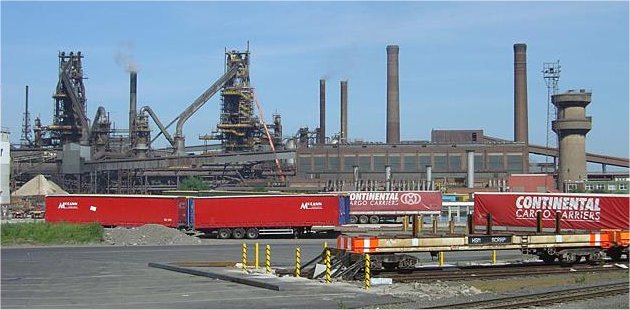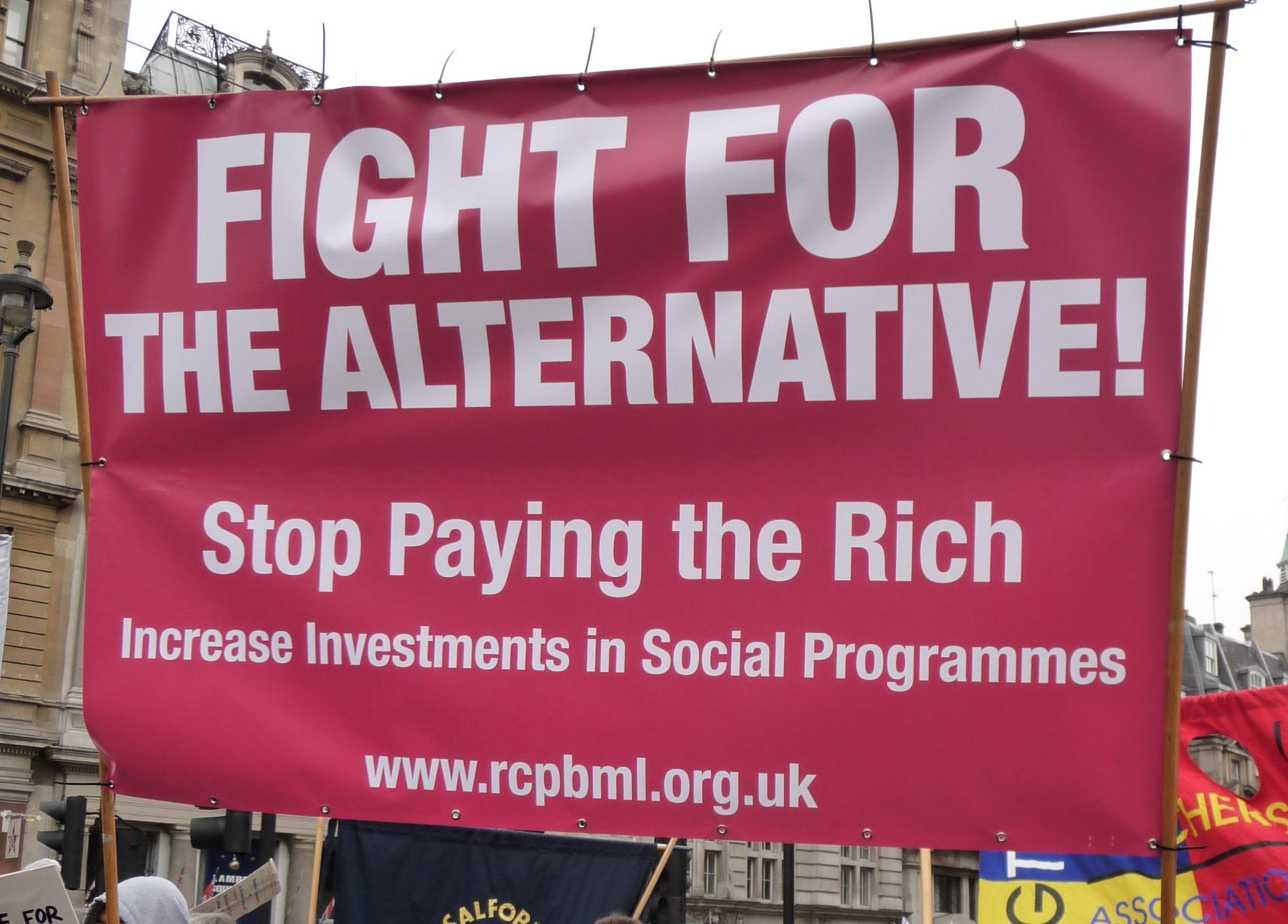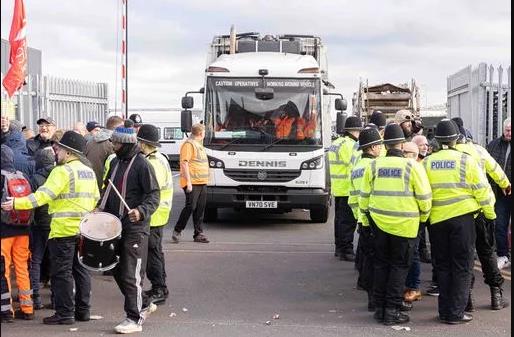
 |
||||
|---|---|---|---|---|
| Volume 55 Number 9, April 19, 2025 | ARCHIVE | HOME | JBCENTRE | SUBSCRIBE |
Workers' Weekly Internet Edition: Article Index :
Legitimising and Enforcing Executive Rule:
The Government's Last Minute Desperate "Race to Save British Steel"For Your Reference::
Government Seizes Control of British Steel's Scunthorpe PlantGovernment Takeover of British Steel:
Comments of Chinese EmbassyFighting for the Alternative:
Birmingham Bin Workers Confident They Will Prevail in their StruggleGlobal Actions:
Widespread Participation in Global Strike for Gaza and Support for PalestineStop the War News:
Movement to Hold British Government to Account for its Complicity in War Crimes and Genocide

Scunthorpe blast furnaces - Photo:
Wikipedia
On Saturday, April 12, the government recalled the MPs and the Lords to Parliament, including arranging King Charles III for the Royal Assent, to pass in one day an Act of Parliament, the Steel Industry (Special Measures) Act 2025 [1] to put on hold the immediate closure of the blast furnaces at British Steel Scunthorpe owned by the Jingye Group, a Chinese steel-maker. The closure of the steel plant is directly threatening three to four thousand jobs and would devastate employment in Scunthorpe as well as end the production of virgin steel in Britain, forcing manufactures to import all virgin steel from abroad, or rely on recycled scrap steel.

Announcing the Bill, Prime Minister Keir Starmer claimed that in passing the Act "today, my Government has stepped in to save British Steel". However, the Act only states that it is "An Act to make provision about powers to secure the continued and safe use of assets of a steel undertaking." Yet he continued to claim that "we are acting to protect the jobs of thousands of workers, and all options are on the table to secure the future of the industry". He also claimed that his government is "turning the page on a decade of decline, where our manufacturing heartlands were hollowed out by the previous government".
In the debate on the Bill, the Secretary of State for Trade and Industry, John Reynolds, whilst he claimed the government was "unashamedly on the side of working people" and he admitted that "steel is vital to every bit of a modern economy", he also revealed where this last minute and desperate concern of the government about the closure of the last blast furnaces in Britain has come from. He said, "Let me conclude by saying that steel is fundamental to Britain's industrial strength, our security and our identity as a primary global power." In other words, as the government continues to escalate support for Britain's militarised economy, the export of weapons to Israel and other countries in its genocidal war against the Palestinians and one of the prime movers in NATO's proxy war in Ukraine the loss of steel making as a whole is seen as "fundamental" blow to the government's warmongering plans. It should be remembered that peace and security are indivisible, and that militarisation only leads to insecurity and war.

Scunthorpe steel workers fighting to their jobs and all
steel workers in 1980
Following the passing of the Act, British officials were said to have stepped into what was described by the Independent [2] as a "desperate race to save its blast furnaces after what ministers believe was a plot to sabotage the Scunthorpe plant by its Chinese owners". Also the paper reported that "on Sunday, business secretary Jonathan Reynolds said Chinese firms should be barred from investing in some sectors, including those vital to national security and key infrastructure". These and many other comments, as well as outrageously attempting to paint China as a threat to British security and sovereignty, were designed to place the pending complete demise on the production of virgin steel in Britain on the backs of this Chinese company ignoring the whole history of British Steel Scunthorpe and the role played by the Westminster cartel party system over decades of the run down and closure of the whole steel industry in Britain. It is a process that began with Margaret Thatch er bringing in the Scottish-American industrialist Ian MacGregor in the 1980s to oversee the privatisation of British Steel.
In 2016, the long products division (e.g. railway lines and construction steel) including the Scunthorpe steel works was sold by Tata to the asset stripping company Greybull Capital for a nominal sum of £1 but took on liabilities accumulated by Tata. This was when the business was renamed British Steel Ltd. Scunthorpe had been part of the twice nationalised steel industry in Britain following World War II which was finally privatised in 1988 under the Conservative government led by Prime Minister Margaret Thatcher.

Steel workers strike 1980
In May 2019, British Steel Scunthorpe was placed by Greybull Capital into compulsory liquidation. Control of the company passed to the official receiver while a buyer was found. After huge protests from the workers and people of Scunthorpe, the sale of British Steel to Jingye Group was overseen by the UK Conservative government led by Prime Minister Boris Johnson, with Business Secretary Andrea Leadsom handling the negotiations. According to reports, the government saw this as a strategic move amid UK-China relations pre-pandemic and in March 2020, Jingye Group became the owner of British Steel costing £50 million plus pledges of £1.2bn in investment. Following the purchase, the Jingye Group invested £330 million in capital projects during its first three years of ownership. However, the closure of the coke plant was announced in February 2023 with the loss of 260 jobs.
In November 2024, the company opened a new £10 million "rail hub" which has the capacity to hold 25,000 tonnes of rail in 354ft (108m) lengths. However, during 2024 Jingye also implemented significant cutbacks, including blast furnace shutdowns and job losses. According to reports, Jingye cited that the company was losing £30-50 million per month due to high energy costs (UK industrial electricity prices are among Europe's highest), cheap steel imports from China, India, and Türkiye, and weak demand in construction and rail sectors which the plant specialised in.

Save Our Steel Campaign Port Talbot
Also in 2024, the Jingye Group stalled the full promised investment in negotiations with government over funding for the government's net-zero targets, requiring steel makers to invest to slash carbon emissions. Reports say that Jingye demanded the same subsidies as Tata of £500 million (reports say the government offered Jingye £300 million), with their plans to make a transition to Electric Arc Furnaces (EAFs) at British Steel Scunthorpe just as Tata had done at Port Talbot. This was to replace Scunthorpe's traditional blast furnaces (BFs) and basic oxygen steel making (BOS) with EAFs as part of its decarbonisation strategy requiring less energy and a much smaller work force. However, production of virgin steel would be ended at all plants in the UK and the EAFs rely on the availability of high quality scrap steel which reports say is not always available, especially for rails and construction.
On February 4, the steel unions the GMB, Community and Unite, warned that
the government must meet the "additional carbon costs" involved in
order to proceed with their bid to save thousands of jobs [3]. GMB national
officer Charlotte Brumpton-Childs said that "the major barrier" is
the additional carbon costs to be paid under government policy regulations.
"For our plan to be viable - we need ministers to provide relief from
these policy costs, just as other European countries have done," she
added. A Department for Business and Trade spokesperson said: "This
government will simply not allow the end of steel

Militant demonstration of Redcar steelworkers, July 18
2009 - Photo: RachelSNmaking in the UK. That's why we've
committed up to £2.5 billion of investment to rebuild the UK steel
industry and support communities now and for generations to come. We're working
across government in partnership with trade unions and businesses, including
British Steel, to secure a green steel transition that's right for the
workforce, represents a good investment for taxpayers and safeguards the future
of the steel industry in Britain."
Responding to the government's Steel Industry (Special Measures) Act 2025, Sharon Graham, General Secretary of Unite, commented: "I am pleased that the government has listened to representations by Unite and other steel unions over the future of British Steel. Ministers could not have allowed a foundation industry to go under with the loss of more than 3,000 jobs and key skills. It is absolutely the right thing to do to begin the process of nationalisation."
However, only last September, Tata also ended its virgin steel production at its Port Talbot plant in Wales [4]. At that time Labour's Chancellor, Rachel Reeves, spoke about "the importance of addressing the foundations of the economy, including steel production". Again these words rang hollow in the face of this unilateral closure by Tata. Time and a time again over recent years with the closure of steel production in Consett, in Corby, in Redcar, the jobs of the steel workers and their communities have been at the mercy of the powerful competing private interests of the oligopolies that cannot offer solutions and instead destroy vital productive forces and skills in the name of receiving the most subsidies and making the most profit. Whilst time and again the alternative plans of the workers and their unions are rejected by the cartel parties it is up to the working class to keep these oligarchic governments in check and fight for their interests that represent the interests of society and its future. A new direction for the economy is needed.
Notes
1. Steel Industry (Special Measures) Act 2025
https://www.legislation.gov.uk/ukpga/2025/13/contents/enacted
2. Race to save British Steel factory after Chinese firm's 'sabotage',
Independent, Monday April 14 2025
https://www.independent.co.uk/news/uk/home-news/british-steel-scunthorpe-jingye-group-b2732572.html
3. British Steel 'warm' on blast furnace plan
https://www.gmb.org.uk/news/british-steel-warm-on-blast-furnace-plan
4. Further Destruction of Manufacturing over Which Workers' Decisive Say Is
Being Denied, Workers' Weekly, October 12 2024
https://www.rcpbml.org.uk/wwie-24/ww24-25/ww24-25-06.htm

In a rare Saturday sitting of Parliament, on April 12 the government passed emergency legislation to take control of British Steel's Scunthorpe plant, the country's last remaining producer of virgin steel. The intervention, led by Business Secretary Jonathan Reynolds, grants ministers temporary powers to direct operations, guarantee pay for thousands of workers, and ensure the procurement of raw materials to maintain production. Chinese owner Jingye Group had planned to shut down the plant's blast furnaces due to mounting financial losses - estimated at £700,000 a day - and spiralling environmental costs.
While Reynolds emphasised that ownership remained with Jingye, he also emphasised that the government now has the authority "to act decisively in the national interest" to protect strategic industrial capacity, including jobs for around 2,700 workers. "The decision to step in wasn't taken lightly," Reynolds told MPs. "But we simply cannot allow the UK to lose its sovereign capacity to make steel from scratch. This is about economic security, national infrastructure, and supporting communities that built this country." No mention was made in this connection of Britain's entanglement with the foreign policy of the US and its plans to be the world's "indispensable nation" and its involvement in wars of aggression and destruction, crimes against humanity and genocide.
What Was Said
Conservative Party spokespeople accused Labour of indulging in "ideological throwbacks" and warned that state interference risks undermining investor confidence.
"This government talks a lot about modernising the economy, but this is pure 1970s nationalisation in all but name," said Shadow Business Secretary Kemi Badenoch. "No-one disputes the importance of steel, but Labour's approach risks turning taxpayers into long-term owners of loss-making assets with no clear exit plan." Former Chancellor Jeremy Hunt echoed the concern, adding: "Where is the plan for reform and investment? Taking over British Steel might buy some time, but it won't solve the underlying problems without private sector innovation and accountability."
The Liberal Democrats offered more measured support but raised questions about the government's long-term strategy.
"This is a vital short-term intervention, and the government was right to act to save jobs and production," said Liberal Democrat business spokesperson Sarah Olney. "But what we need now is transparency, a proper industrial strategy, and safeguards to prevent this from becoming a blank cheque." She also called for "a full review of how the government handles strategic industries and foreign ownership," saying the Scunthorpe crisis highlights vulnerabilities in how the UK manages critical infrastructure.
Unite the Union hailed the move as "a lifeline for steelworkers" and demanded longer-term investment in low-carbon steelmaking to ensure a sustainable future.
At Stake
British Steel's Scunthorpe site is not only a major employer in Lincolnshire but also produces 95% of the UK's rail track and plays a key role in national defence and infrastructure supply chains.
The emergency legislation also includes provisions for future state ownership, or a move toward a public-private partnership, if negotiations with Jingye falter. A transition to electric arc furnace (EAF) technology remains part of the long-term vision, but union leaders warn this must not come at the cost of mass redundancies.
Next Steps
The government has promised an update within 30 days, with a new Industrial Transition Plan to be published before the summer. Consultations with local stakeholders and unions are expected to begin immediately. In the meantime, the blast furnaces will continue operating under government direction.
(ukpol.co.uk)
Republished below are the remarks by a spokesperson for the Chinese Embassy in London regarding the UK government's takeover of British Steel.

Jingye
The spokesperson points to the surge of anti-China propaganda among politicians and in the media following the announcement by Jingye, the Chinese company that owns British Steel, that it would be shutting down the blast furnaces at its Scunthorpe plant. For example, UK business secretary Jonathan Reynolds told Sky News that the British government had in the past been "far too naive" about UK-Chinese trade. Various commentators have resurrected tropes about China using its investments in Britain to conduct espionage or to "disrupt infrastructure for geopolitical leverage". This sort of anti-China rhetoric is "extremely absurd, reflecting arrogance, ignorance and a twisted mindset".
The spokesperson notes that the Jingye Group is a private enterprise that works on the basis of normal commercial principles, and that the Chinese government has no control over its operations. Having poured vast amounts of money into British Steel and lost hundreds of millions of pounds in the process - and given negotiations with the UK government over the future of the plant had failed to yield results - Jingye made a commercial decision to shut down the blast furnaces. "British Steel's plan to close its blast furnaces and build electric arc furnaces is a normal decision, and it is understandable that the company conducted negotiations with the government on investment for the transition."
The comment notes that, in general, "Chinese companies in the UK have operated in compliance with law and achieved steady progress." Given the importance of Chinese investment and trade in supporting the Labour government's stated commitment to economic growth, it seems foolhardy to politicise the issue of Jingye's operations and create a discriminatory business environment.
This message was reiterated by Chinese Foreign Ministry spokesperson Lin Jian: "We hope that the British government will treat Chinese companies investing and operating in the UK in a fair and just manner, protect their legitimate rights and interests, and refrain from turning economic and trade co-operation into political and security issues lest it should undermine the confidence of Chinese companies in their normal investment and operation in the UK."
The remarks by the embassy spokesperson also highlight the hypocrisy in fiercely criticising China whilst not offering even the mildest critique of the Trump administration's unilateral tariff war. "At a time when the US is wielding the tariff stick against all countries, the UK included, and engaging in unilateral and protectionist trade bullying, those British politicians just keep slandering the Chinese government and Chinese enterprises instead of criticising the United States."
The comments were first published on the website of the Chinese Embassy in the UK. [1]
Question: Recently, there have been various comments in the UK regarding the government's takeover of British Steel. Several politicians took the opportunity to attack all Chinese companies and the Chinese government. What's your comment?
Embassy Spokesperson: The anti-China rhetoric of some individual British politicians is extremely absurd, reflecting their arrogance, ignorance and twisted mindset. Regarding the issue of British Steel, I'd like to share a few basic facts.
1. The Jingye Group is a private Chinese enterprise that makes business investments in the UK on the basis of market principles and conducts operation on its own.
2. It is well-known that British Steel had been losing money for many years before its acquisition by Jingye in 2020 and actually went into compulsory liquidation in 2019. After taking over, Jingye put in substantial funding to keep the company afloat to this day. Had it not been for the involvement of this Chinese company, British Steel workers might have already faced the risk of unemployment.
3. It is understood that under the UK government's net zero strategy, steel companies that use iron ore to make steel must achieve net zero emissions by 2035. To that end, British steel companies including British Steel have all negotiated with the government to find a path to decarbonisation transition. Among them, the Port Talbot Steelworks in Wales closed its blast furnace in July 2024. British Steel's plan to close its blast furnaces and build electric arc furnaces is a normal decision, and it is understandable that the company conducted negotiations with the government on investment for the transition.
4. Generally speaking, Chinese companies in the UK have operated in compliance with law and achieved steady progress. They have made positive contributions to the local economy. According to statistics available, Chinese companies in the UK have contributed over £115 billion to the UK economy and created nearly 60,000 jobs.
5. At a time when the US is wielding the tariff stick against all countries, the UK included, and engaging in unilateral and protectionist trade bullying, those British politicians just keep slandering the Chinese government and Chinese enterprises instead of criticising the United States. What on earth are they up to?
6. Any words or deeds that politicise or maliciously hype up business issues will undermine the confidence of Chinese business investors in the UK and damage China-UK economic and trade cooperation. We urge the British government to follow the principles of fairness, impartiality and non-discrimination and to make sure that the legitimate rights and interests of Chinese companies in the UK are protected. At the same time, it is hoped that the British government will continue to engage in consultations and negotiations with Jingye to actively seek a solution acceptable to all parties. We will continue to follow the development of this situation.
Note
1.
http://gb.china-embassy.gov.cn/eng/PressandMedia/Spokepersons/202504/t20250416_11595415.htm
(Friends of Socialist China)

Birmingham bin picket - Photo: Unite
The strike of the bin workers in Birmingham [1], which deserves the support of all concerned people, is taking place in the context of the imposition of so-called "fixing the foundations of local government", as Jim McMahon, Minister for Housing, Communities and Local Government, termed it in opening a debate in the House of Commons on Birmingham City Council on March 31, 2025.
Government-appointed "commissioners" were brought in after the council effectively declared bankruptcy in 2023. The "commissioners" were to oversee the council's financial recovery, according to reports [2]. "Bankruptcy" in this context appears to mean that it will not make new spending commitments, being faced with reduced government funding, rising spending on social programmes, or mismanagement. In seeking to appeal to the government to meet necessary levels of funding, the council has been met with the appointment of "commissioners" charged with ensuring spending cuts are implemented. Thus the "commissioners" have played their role in overseeing the council's financial decisions, including those related to waste collection services. The removal of the Waste Recycling and Collection Officer (WRCO) role by the council was one of the issues which sparked the strike on March 11.

Police break picket line Atlas Road depot - Photo: Nick
Wilkinson BirminghamLive
The government has sought to affirm that the bin workers dispute has nothing to do with them, and it cannot legally intervene in the industrial action as it is a dispute between the workers and the "commissioners". Nevertheless, it has lost no time in siding with the "commissioners" and calling on the workers to accept a new deal to end the dispute.
On April 14, the striking bin workers overwhelmingly rejected the council's latest offer, which was termed "totally inadequate" by the workers and their union. The deal, which still includes substantial pay cuts for workers, also does not protect from £8,000 pay cuts, nor does it address potential pay cuts for 200 drivers.
Deputy Prime Minister Angela Rayner said that a "significantly improved" offer had been made and that the city council had "moved significantly to meet the demands of the workers so we can see an end to this dispute". The response of Unite General Secretary Sharon Graham was that the deal referred to by Rayner represented "a partial deal on pay protection for a few" and that the striking bin workers were "in the driving seat around what they wish to accept".
.jpg)
Birmingham bin workers - Photo: Unite
The Unite leader said: "Whilst it is helpful that the government finally realised after weeks that they have a role in this dispute, the constant attacks and briefings against these low paid bin workers is frankly a disgrace." She said that the new deal "still leaves these workers worrying about how they are going to pay their mortgages and rent payments in a few months' time". [3]
In fact, the government has also intervened in other ways, for instance seeking to make the picketing a law and order issue. A day after the visit by local government minister Jim McMahon, police officers changed their approach to policing a picket line at the Tyseley depot. Unite members had previously been effective at delaying bin lorries from being deployed, but from April 4 they were told their actions could amount to public order offences. Jim McMahon said that 120 wagons had completed their rounds on the day, compared with about 20 a week previously. The government has also employed army personnel, not in an overt form of soldiers removing the health hazard of thousands of tons piled-up rubbish, but in what is mysteriously described as "logistical support" by a "small number of office-based military planners". [4]
Unite reported that talks had continued on April 16. Unite asked council negotiators to put in writing what has been said in public by them, so members could consider it as an official offer.
1. That no-one would lose any pay.
2. That WRCO workers that moved sideways into new jobs would not lose pay in
the long term.
3. That drivers would not lose pay by being downgraded, which would result in
an £8,000 loss.
4. That WRCO workers who do not wish to make a sideways move would receive a
one-off payment of £16,000 to cover two years loss of £8,000 in pay
cuts.
Unite reported that the council negotiators refused to put this in writing. The union offered to continue negotiations for the rest of the week and over the bank holiday weekend. However, the council has said talks will not resume until next Wednesday.
Other unions such as the FBU have declared their solidarity with the Unite union and the bin workers. Andrew Scattergood, Fire Brigades Union Executive Council member for the West Midlands, said: "We do not break strikes. The FBU would advise members to refuse to carry out such work." FBU General Secretary Steve Wright said: "Birmingham bin workers are public servants who provide an essential service. They have our full solidarity in their fight to defend their pay, jobs and conditions. It's time for Birmingham Council to settle this dispute."
In maintaining their unity and fighting for their dignity, the bin workers are adhering to the workers' spirit that "Enough Is Enough". In persisting in their struggle with confidence that they will prevail, the bin workers are building unity around the fact that there is a way out of the crisis, and this lies in fighting for the alternative and against the cuts. In other words, the alternative is being outlined by the bin workers speaking in their own name and maintaining their own perspective on the struggle. For the workers, this is being "in the driving seat", concerned not only with the attacks on their pay and conditions, but also with the necessity to fund social programmes such as waste collection which are the responsibility of the council on behalf of the society.
Donate to the strike fund - Unite WM/7186 Branch, account: 20308397, sort code: 608301. Title donation: BCC Strike Donation
Notes
1. For earlier background to the strike, see Workers' Weekly
https://www.rcpbml.org.uk/wwie-25/ww25-07/ww25-07-06.htm
& Workers' Weekly
https://www.rcpbml.org.uk/wwie-25/ww25-08/ww25-08-04.htm
2. See, for example, "Birmingham bin strikes explained", Circular:
https://www.circularonline.co.uk/news/birmingham-bin-strikes-explained-what-is-the-dispute-about/
3. Unite general secretary Sharon Graham said: "For weeks, these
workers have faced attacks from government and their employer pushing the lie
that only a handful of workers are affected by the council's plans to cut pay
by up to £8,000.
"Instead of peddling untruths about these low paid workers and focusing on
winning a media war, the government should have taken the time to check facts
and used its office to bring the council to the table in a meaningful way.
"The rejection of the offer is no surprise as these workers simply cannot
afford to take pay cuts of this magnitude to pay the price for bad decision
after bad decision.
"From the start, the council has constantly moved the goalposts for these
workers, prolonging the strikes in the process. First it was equal pay, then it
was about improving the waste service, then cost cutting. The list goes on.
"Unite has set out simple and reasonable steps to the council to resolve
these issues. It is important to remember that this dispute is not about a pay
rise; it is about preventing serious pay cuts.
"The government must now call a meeting with the stakeholders to ensure
these steps are taken to bring the strike to an end.
"The government must now also urgently consider Unite's proposal for debt
restructure at Birmingham City Council and other local authorities. Workers and
communities cannot continue to pay the price."
4. London Evening Standard:
https://www.msn.com/en-gb/politics/government/army-to-help-tackle-birmingham-rubbish-as-bin-workers-vote-on-strike-deal/ar-AA1CRQ1A#:~:text=The%20Army%20has%20been%20called%20in%20to%20help,%E2%80%9Cpartial%20deal%E2%80%9D%20aimed%20at%20ending%20their%20
(BBC, Unite, NSSN)

In a powerful display of continued global grassroots mobilisation aimed at pressuring world leaders and governments to act against the ongoing genocide in the Gaza Strip, a global general strike took place on April 7 in solidarity with Gaza and to protest against Israel's brutal and relentless assault.
Arab countries have seen wide participation at the public level. Unions and institutions in Jordan, Kuwait, Egypt, Morocco and Tunisia announced their commitment to the strike.
In the occupied West Bank and Jerusalem, the strike took on a more official tone following decisions from the Ministry of Education to suspend schools and similar decisions suspending operations in various public institutions.

Activists in Jordan and Egypt stressed that the strike was limited to a one-day work stoppage, clarifying that it was not a call for civil disobedience or a protest against local governments.
The aim of the strike was to increase pressure on governments to take meaningful action to halt the Israeli escalation in Gaza. Events included work stoppages, the closure of commercial shops and demonstrations in front of embassies, with large participation from the Arab public and the international community.
Over the previous weekend, numerous pro-Palestine protests also took place calling for an immediate end to the genocide carried out by Israeli forces in Gaza since October 7, 2023.
The Follow-Up Committee of National and Islamic Forces in Gaza called for impactful and sustained action to pressure the Israeli occupation and its sponsors to stop the genocidal campaign against the people of Gaza.
In a statement, the forces issued "a call on behalf of every slaughtered child, every grieving woman, and every oppressed elder," urging the Arab and Islamic nations and all free people around the world to rise up globally in support of the Palestinian people in Gaza and to reject the US-backed massacres.
Several European cities also witnessed demonstrations in support of Palestine, condemning the atrocities in Gaza as among the worst forms of racism, and highlighting the deafening global silence surrounding Israel's crimes against civilians, women and children in the Strip. Many Palestine supporters have actively engaged with strike calls.
Actions were also held in the United States. In Washington DC thousands rallied in the heart of the US capital on April 5 to oppose Trump administration attacks on free speech and student activism, and demand an end to Israel's relentless genocidal onslaught against Gaza. Students, organisers, journalists, artists, and workers came to Washington, DC from across the country to call for the release of pro-Palestine students such as Mahmoud Khalil and Rumeysa Ozturk from ICE detention and to declare their fearlessness in the face of Trump's attacks.
(TML)

On May 15, Stop the War will be holding the next national workplace day of action for Palestine, supported by the TUC. It is asking all activists and trade unionists to get involved and get organising asap. Actions can be big or small - from lunchtime protests and marches to bake sales or simply wearing a Palestine badge to work - do what you can and let Stop the War know so it can publicise the action.
Israeli forces have now seized about 20% of Gaza territory and are insisting they will maintain an armed presence in the Gaza "security zone" beyond any settlement to end the war, undermining any progress towards a ceasefire.
It is beyond disgraceful that David Lammy, the UK Foreign Secretary, held a secret meeting in London on April 15 with Gideon Sa'ar, Israel's Foreign Minister. Clearly worried about demonstrations and protest, the government did not announce or confirm the visit until Sa'ar had departed.

Gideon Sa'ar is a key member of Netanyahu's government and has openly supported cutting all humanitarian aid to Gaza, with full knowledge of the impact on civilians and that collective punishment is a war crime.
The decision to welcome a genocide supporter and enabler, a man who should be dragged before the International Criminal Court, into the heart of our government shows just how complicit the British state is in Israel's genocide.
This is why it is so important the next national demonstration is as big as possible. The next national demonstration for Palestine will be on Nakba day - the day of commemoration for the catastrophe in 1948 when Palestinians were expelled from their homes. Saturday, May 17 - Central London - 12 noon. Let's use the Day of Action to help build the May 17 demo.
The No More Austerity march and rally on June 7 must be as big as possible, and Stop the War asks all its supporters and groups to do what they can to build it - petitions, street stalls, trade union resolutions. The arguments cannot be more stark and the stakes could not be higher. Begin organising now to join the Welfare not Warfare anti-war bloc.

Receive Workers'
Weekly E-mail Edition: It
is free to subscribe to the e-mail edition
We encourage all those who support the work of RCPB(ML) to also support it
financially:
Donate to
RCPB(ML)
Workers' Weekly is the weekly on
line newspaper of the
Revolutionary Communist Party of Britain (Marxist-Leninist)
Website:
http://www.rcpbml.org.uk
E-mail:
office@rcpbml.org.uk
170, Wandsworth Road, London, SW8 2LA.
Phone: 020 7627 0599: